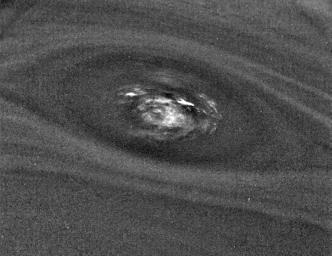
|
Neptune’s Dark Spot (D2) at High Resolution
- Click the image above for a larger view
- Full-Res JPEG (934 x 722) (135.7 kB)
- Full-Res TIFF (934 x 722) (499.8 kB)
Caption:
This bulls-eye view of Neptune's small dark spot (D2) was obtained by Voyager 2's narrow-angle camera on Aug. 24, 1989, when Voyager 2 was within 1.1 million km (680,000 miles) of the planet. The smallest structures that can be seen are 20 km (12 miles) across. This unplanned photograph was obtained when the infrared spectrograph was mapping the planet, and is the highest resolution view of the feature taken during the flyby. Banding surrounding the feature indicates unseen strong winds, while structures within the bright spot suggest both active upwelling of clouds and rotation about the center. A rotation rate has not yet been measured, but the V-shaped structure near the right edge of the bright area indicates that the spot rotates clockwise. Unlike the Great Red Spot on Jupiter, which rotates counterclockwise, if the D2 spot on Neptune rotates clockwise, the material will be descending in the dark oval region. The fact that infrared data will yield temperature information about the region above the clouds makes this observation especially valuable.
Background Info:
The Voyager Mission is conducted by JPL for NASA's Office of Space Science and Applications.
Cataloging Keywords:
| Name | Value | Additional Values |
|---|---|---|
| Target | Neptune | Jupiter |
| System | Neptune | |
| Target Type | Planet | |
| Mission | Voyager | |
| Instrument Host | Cassini Orbiter | Voyager 2 |
| Host Type | Orbiter | Flyby Spacecraft |
| Instrument | Imaging Science Subsystem (ISS) | |
| Detector | Narrow Angle Camera | |
| Extra Keywords | Atmosphere, Grayscale, Infrared, Rotation, Storm, Visual | |
| Acquisition Date | ||
| Release Date | 1996-01-29 | |
| Date in Caption | 1989-08-24 | |
| Image Credit | NASA/JPL | |
| Source | photojournal.jpl.nasa.gov/catalog/PIA00064 | |
| Identifier | PIA00064 | |
